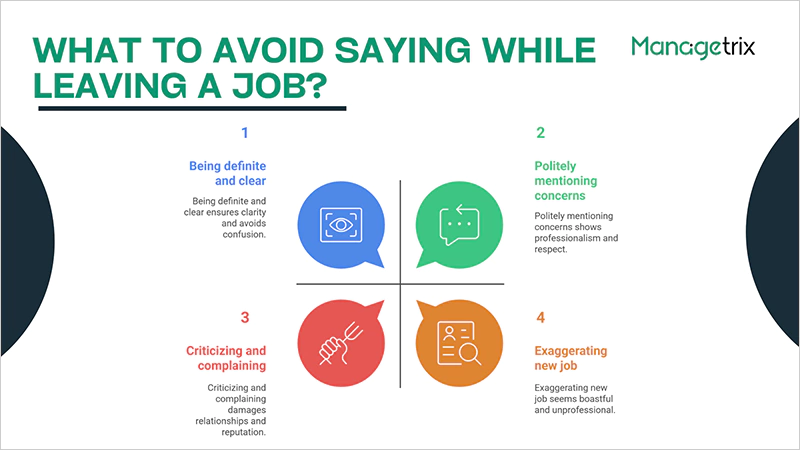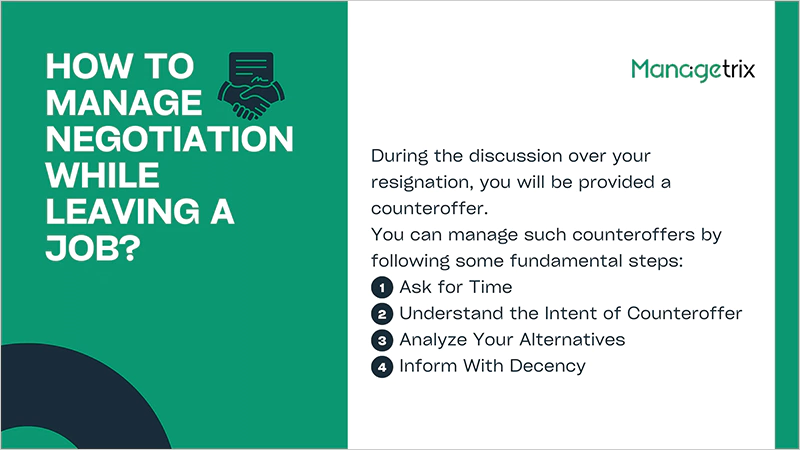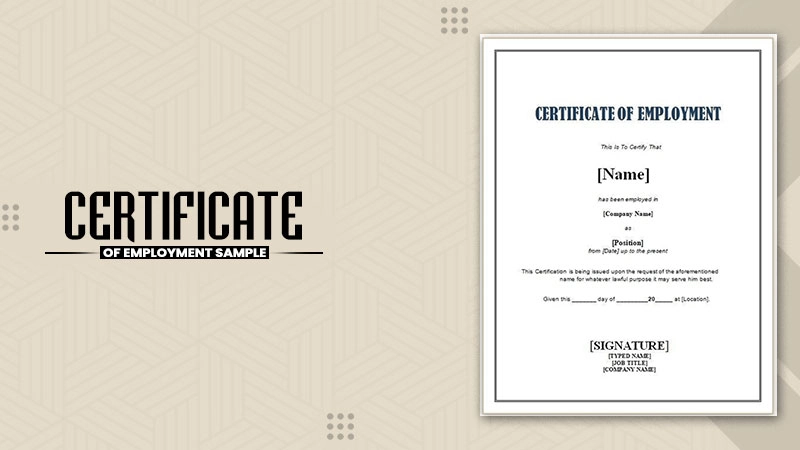In the corporate world, leaving a job is a challenging task, and justifying it is even more perplexing.
Every employee in an organization plays their part, and their resignation leaves a void of talent and skills. Generally, companies try to keep good employees, but if you want to resign, you might need help to smartly select the reason for it. Though your decision to leave might be firm, the rationale behind it needs to be communicated and defended firmly.
But what are the good reason for leaving a job?
If you are struggling with this dilemma, here are 12 best reasons you can select from to advocate for your resignation.
12 Good Reasons for Leaving a Job with Examples
A good reason for leaving a job must explain your career growth and long-term plans without tarnishing the image of the firm you currently work at. For this, you need a strong, valid, and acceptable reason.
So here are 12 good reasons for leaving a job and ensuring a smoother transition.

Seeking Better Compensation
Expecting better compensation or being unsatisfied with the current perks is a valid and accepted reason to leave a job. Competitive remuneration exhibits your experience and skills developed while working for the firm. Such issues can be linked to the salary, fringe benefits, imputed income, and other such aspects.
Example: As I have been entrusted with more responsibilities and have gathered immense experience in my field, I am looking for opportunities that would provide satisfactory compensation.
Career Growth
If you find limited progress in your current role, it will naturally repel you and incline you toward more challenging and progressive positions. You can use this reason to leave a job by citing your keenness to develop your skill set and align with long-term goals.
Example: Though I have been investing my time, efforts, and expertise into the progress and development of the firm and the business, I have decided to opt for new opportunities that serve my career growth.
Bypass Layoff
Organizational restructuring or economic downturns may stimulate potential layoffs. To dodge it, you can voluntarily relinquish the role as a strategic decision for career stability and continued growth.
Example: I have come across news of the layoffs procedure opted by the company to cut down on extra financial and human resource burdens. Though I have immense potential and rich expertise, which can be beneficial to the firm, I have decided to resign from my post.
Career Shift
Your deliberate and thoughtful decision to explore new career roles that match your long-term pursuits is also a good reason to leave a job. Such a shift allows you to enhance your skills afresh and pursue greater fulfillment.
Do you remember Mahendra Singh Dhoni, who switched his career despite having a stable career option? He is the best example of leaving a job to make a career shift.
Example: I have been privileged for the role I serve in this firm. I have finetuned my caliber in my new skills and have decided to shift my career in it. For this, I respectfully want to regain my post as a strategic part of my career shift.
To Pursue Education
Pursuing further education is a commendable reason and an unchallenged rationale to give up a job. It reflects your commitment to personal and professional growth and your enthusiasm to learn and enhance your capabilities.
Example: As I have been interested in pursuing my education, I have gotten the opportunity to join a reputed institution to continue my academic endeavor, due to which I am resigning from my current role in the firm.
Manage Work-life Balance
Many times, you might seek roles that provide a better equilibrium between professional duties and personal commitments. Hence, you can use it as a strong reason to switch jobs to put a positive impact on your productivity, job satisfaction, and well-being.
Example: With time, my responsibilities in my family have increased, and I am finding it hard to manage my roles between household and job. To strike a balance between these 2 ends, I humbly request you to accept my resignation.
Personal Reasons
Some personal reasons can also be quoted in your resignation letter, such as health reasons, changing family dynamics like divorce or marriage, etc.
Example: As I am going through tough conditions related to my health and family circumstances, I need a gap from my professional life to give priority to my physical fitness and stabilize family situations.
Relocation
Relocation with family is a valid and readily acceptable reason to put in a resignation letter. If your personal commitments cause you to leave the place, and the firm has no provision for work from home, then switching jobs comes out as a valid reason.
Example: I am grateful for the opportunities I have had here, but as I am moving to a new place, it makes it difficult for me to continue in my current role. So, I am stepping down from my position.
Got a Chance in an MNC
You might be applying to a firm that can stimulate your career growth. Getting an opportunity in an MNC can be a good reason to leave a job, as it will provide you with global exposure, good networking opportunities, and immense career benefits.
Example: I am resigning from my current role to opt for a new opportunity in XYZ MNC to fine-tune my skills and abilities, and make a firm foundation for my career.
Changed Corporate Culture
If the office culture has shifted to a less supportive side, and there appears to be non-cooperation in the team, or you feel highly pressured, you can mention it in your resignation letter.
Example: The overall culture of the firm has changed in the past few years, with a stark difference in opinions and non-compliance with the seniors’ decisions. Owing to this, I am resigning from my current role to opt for better opportunities with a stable corporate culture.
Overqualification
Being overqualified may cause you to feel less motivated, for your skills are being underutilized. Explaining overqualification as a reason to step down from a position in a job is a valid and workable idea to explore new, challenging opportunities and enhance job satisfaction.
Example: I would like to resign from my position as I am seeking opportunities that better match my qualifications and skills and pursue roles that align with my educational background and expertise.
Choosing My Passion
Choosing passion over a job will give you sustainable career growth with mental and emotional well-being. For this, you can explicitly cite your reason for leaving the job, such as pursuing photography, preparing for an exam, or similar reasons.
Here, the best example to quote is Amazon CEO Jeff Bezos, who left his job at D.E. Shaw to become an entrepreneur.
Example: I would like to resign from my position as I have decided to pursue my passion, which requires my full attention and commitment. I am grateful for the opportunities I have had during my time in this firm.
Out of these suggestions, you can pick any one or a few to back your resignation. But make sure it suits your judgment, and you can justify it professionally.
Suggested Reads: How to Write a Leave Letter for Work? Here is the Format with 10 Unique Samples
Why is the Reason for Leaving the Job Important in Your Resignation Letter?

A good reason for leaving a job is always necessary to facilitate the easy acceptance of your resignation from the post. Besides, it is also necessary to ease out your transition between the companies while keeping the professional relations intact.
In addition, here are some other notable reasons why the reason for leaving the job is important in your resignation letter.
- To improve the Company’s Hiring Strategy: Resignations reflect the gaps in the company’s hiring and retention strategy. Providing a good reason also helps the firm’s administration to improve and evolve its work culture.
- Maintain Professionalism: Leaving a job without a reason may bring the company management into a dilemma, which can affect the professionalism in.
- Maintain Good Corporate Connections: Providing a good reason for leaving a job will add to your corporate connections, which can benefit you in the long term.
- Attracting a Good Counteroffer: If your reason for leaving the job is related to any inconvenience, then you will be provided a counteroffer. You can consider that offer and make a wise decision afterward.
How to Explain the Reason for Leaving a Job?

The formal communication between the employee and the firm needs to be conducted professionally, which is reflected in the appointment letter and the relieving letter. Similarly, you must stay humble, professional, and direct in communicating your grounds for leaving a job.
In this perspective, here are some tips that you need to adopt while communicating the reason for leaving a job.
- Underline Career Growth: You must highlight how your next step supports your progress and learning. You can also express your enthusiasm for new challenges.
- Explain Plans: In your resignation letter, you can briefly share your future goals by explaining how the changes will help your professional plans.
- Stay Ready for Questions: You will be counter-questioned for your plans and decisions. Try preparing for a bunch of fundamental questions that can be asked in the cabin.
- Stay Honest: You can tell the truth about the cause of your resignation in a very professional manner. Refrain from blaming anyone and focus on a constructive explanation.
These grounds need to be communicated in a certain way to leave a positive impact on the administration of the firm.
Also Check: Best Skills to Put on a Resume to Get Shortlisted in 2025
What to Avoid Saying While Leaving a Job?

After going through good reasons to leave a job, you must also be aware of what you must not speak about during your resignation discussion.
Apart from your reason to leave the job, your attitude and mindset while discussing the decision matter a lot in front of the hiring manager or HR manager.
From this perspective, here are some responses that you need to refrain from during such discussions.
- Don’t Criticize and Complain: While resigning from a job for its bad corporate culture, you should politely mention the concern, without condemning the company’s rules or professional perspectives.
- Avoid Exaggerating the new Job or Role: If you are leaving the job to join the other one, mention the firm and your prospective role, without exaggerations and over-exposing the specification about the new opportunity.
- Refrain from Making Demands: It always looks inappropriate to make unnecessary demands, hike, or compensation while leaving the job. Ask genuine doubts about the compensations and remuneration provided after resignation.
- Don’t be Regretful: Switching jobs is a part of corporate culture. Don’t be over-apologetic for resigning from your current firm. Be definite, clear, and precise in your reason for leaving a job.
How to Manage Negotiation While Leaving a Job?

During the discussion over your resignation, you will be provided a counteroffer, which is a general thumb rule to retain good employees. These counteroffers may contain enhanced perks and compensation, increased salary, or better insurance or equity deals.
You can manage such counteroffers by following some fundamental steps.
- Ask for Time: Although you might have a firm decision, you should ask for some time to think over the counter-offer to analyze and discuss it.
- Understand the Intent of Counteroffer: The ultimate aim of the counteroffer is to make you continue the job, as you would be a valuable human resource for you.
- Analyze Your Alternatives: If you are leaving a job for entrepreneurship or bad health, or continuing your education, then you can consider the counteroffer of freelancing, working from home, hybrid mode, or other similar options that match your demands. However, if the company promised better salary, perks, and compensation, then you can think over it again.
- Inform With Decency: Whether you want to continue or not, be decent, polite, and clear in your response.
All in all, keep your mortality and professionalism intact in handling the counteroffer.
Conclusion
The aforementioned good reason for leaving a job will work best when backed by a genuine explanation during your conversation with the firm’s administration. For this, keep a detailed analysis of your reasons and maintain professionalism in your attitude. Besides all, your job switch must bring some positive outcome to your career.
Next Read: Salary Slip Format: Complete Guide to PDF, Word, and Excel
FAQs
1. What is a valid reason for resignation?
Ans: A valid reason reflects personal growth, better opportunities, work-life balance, or misalignment with company values. The reason must be honest and respectful, and should clearly explain why leaving benefits both parties.
2. Should I put my reason for leaving a job?
Ans: Yes, sharing a clear and positive reason builds trust with future employers. Keep it professional, focusing on growth, new challenges, or alignment with your career goals.
3. Is leaving your job a good idea?
Ans: Leaving a job can be a good idea if it leads to better growth, satisfaction, or health. Evaluate your goals, readiness, and alternatives before making the move to ensure it’s the right choice.
4. How to answer Why did you resign?
Ans: To answer why you resigned, focus on what you’re moving toward, like new challenges or growth, rather than negatives. Keep it concise, professional, and future-focused.





